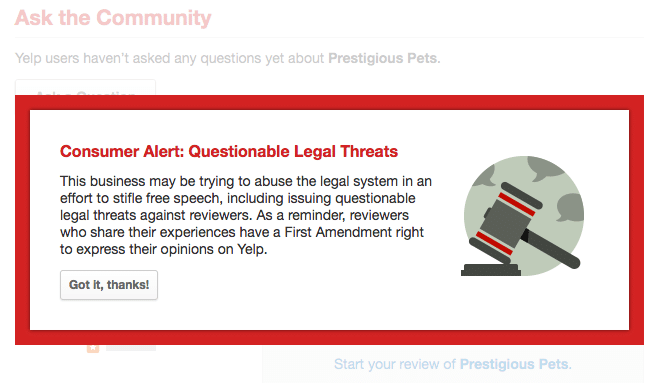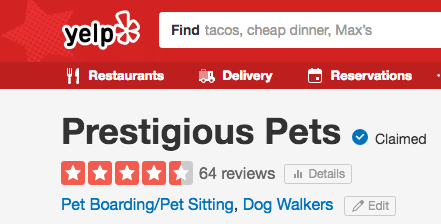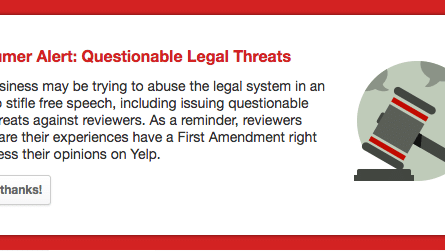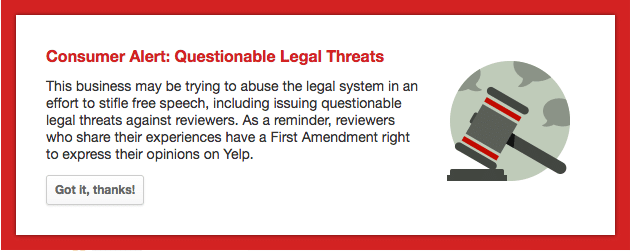Online reviews are a double-edged sword for today’s business. A firm that knows how to manage reviews well can benefit greatly. Businesses that don’t, or simply deserve bad reviews, can be seriously harmed.
Perhaps not surprisingly, some businesses thought they’d try a little legal arm-twisting in order to guarantee good reviews. They began including clauses (known as disparagement clauses) in their contracts that ban customers from posting reviews, or even (in at least one case) clauses that require clients to post good reviews.
An example of the former type of contract is that used by Prestigious Pets, in Dallas, TX. Prestigious Pets, a pet-sitting company, was upset when a customer posted a lukewarm Yelp review. Well, okay, not just lukewarm, but pretty awful.
So Prestigious Pets sued; not just for defamation (which is very hard to prove, especially when it’s a real review rather than a malicious review posted by, say, a competitor)… but they also sued for breach of contract. Initially for $6,700 in small claims court, but later for $1million in big-boy court.
Breach of contract? How is that possible? Well, it turns out that the contract had what’s known as a disparagement clause. Here’s what the original complaint filed by Prestigious Pets said:
“Prestigious Pets has a valid, enforceable contract with Mr. Duchouquette via the Agreement. Under the Agreement, Mr. Duchouquette agreed not to make negative comments about Prestigious Pets and to not disparage Prestigious Pets. In pertinent part, the nondisparagement clause states: “[Y]our acceptance of this agreement prohibits you from taking any action that negatively impacts Prestigious Pets, LLC, its reputation, products, services, management, employees or independent contractors….Any violation of this clause is to be determined by Prestigious Pets LLC in its sole discretion….””
PP’s argument, was, of course, that the Yelp review constituted “defamatory and disparaging statements.”
Think this is a unique event? Not so. Here are a few more examples, from Joe Mullin at ArsTechnica. In the primary story in Joe’s article, the contract even stated that the copyright of photographs taken by tenants in their apartments, and of “written works” about their apartments, would become the landlord’s property.
And another … the Union Street Guest House in Hudson, N.Y. had a contract stating that “there will be a $500 fine that will be deducted from your deposit for every negative review of USGH placed on any internet site by anyone in your party and/or attending your wedding or event.” Wow, I wonder how that turned out for them.
Now, how about a company that requires clients to post good reviews? Joe Mullin wrote about that, too. The City Park Apartments, in Salt Lake City, had a Facebook Addendum added to their contracts. Not only did the Addendum ban bad reviews, but it required that residents “Friend” the City Park Apartments Facebook page within 5 days, and remain friends with the Facebook page as long as they remained tenants.
Disparagement Clauses Never Worked Well in the US… and Don’t Work At All Now
Such disparagement clauses have never stood up terribly well in US Courts; they usually fail to be upheld. But there are two other reasons businesses should stay away from such practices.
First, there’s the new Consumer Review Fairness Act, one of the last bills signed into law before President Obama disappeared on his extended kitesurfing vacation. The FTC (Federal Trade Commission) has recently published regulations related to this Act.
As the FTC states,
“Contracts that prohibit honest reviews, or threaten legal action over them, harm people who rely on reviews when making their purchase decisions. But another group is also harmed when others try to squelch honest negative reviews: businesses that work hard to earn positive reviews.”
I particularly like that last sentence that I have bolded; it’s true, businesses that play these games are also, in effect, hurting honest businesses just trying to do the right thing. Anyway, what’s the effect of this new law? These ridiculous clauses are not simply unenforceable, they are illegal:
“In summary, the Act makes it illegal for a company to use a contract provision that:
- bars or restricts the ability of a person who is a party to that contract to review a company’s products, services, or conduct;
- imposes a penalty or fee against someone who gives a review; or
- requires people to give up their intellectual property rights in the content of their reviews.”
This is important to understand. Such clauses are not merely unenforceable, but can be treated “the same as violating an FTC rule defining an unfair or deceptive act or practice. This means that your company could be subject to financial penalties, as well as a federal court order.” Yep, you could be fined. But go ahead, make your attorney’s day, because you’ll pay a fortune in legal fees, too.
Another Reason? Consumers Will Hate You!
Now, here’s the other reason such actions make no sense; they backfire! What happened to Prestigious Pets? Well, here’s what you see if load the Prestigious Pets Yelp review:

Here’s what I find particularly crazy about Prestigious Pets’ actions. Go look at the top of the Prestigious Pets Yelp review page
Yes, there’s a sprinkling of bad reviews; but perhaps PP should consider those a learning lesson! I do recognize bad reviews can be painful for businesses, in particular fake reviews–I’ve been an expert witness on several lawsuits related to fake reviews, so I’ve seen it in action. But there are much better ways to handle painful–but genuine–reviews. (I’ll blog on this subject soon.)
How about the Union Street Guest House? It must have worked out well for them, though, stopping any and all members of wedding parties from posting negative reviews, eh? (What is a negative review, anyway? 4 stars? 3 stars? 2?) Hmmm, not so well, really:

Consumer’s don’t like these games; far from helping a firm’s reputation, they can very quickly kill it. That’s if the FTC doesn’t get to you first.


